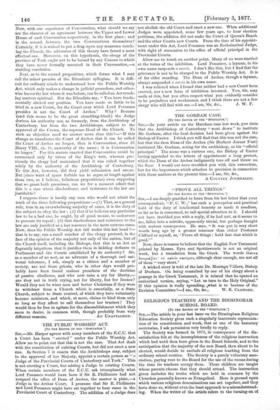THE PUBLIC WORSHIP ACT.
[TO THE EDITOR OF THE "SPECTATOR.") Sra,—Mr. Harper agrees with many members of the E.C.U. that a Court has been " erected " under the Public Worship Act. Allow me to point out that this is not the case. That Act dealt with the constitution of existing Courts, but did not erect a new one. In Section 7 it enacts that the Archbishops may, subject to the approval of her Majesty, appoint a certain person as "a Judge of the Provincial Courts of Canterbury and York." This is not erecting a Court, but adding a Judge to existing Courts. When certain members of the E.C.U. ask triumphantly what Lord Penzance would have been if Sir R. Phillimore had not resigned the office of Dean of Arches, the answer is plain,—a Judge in the Arches Court. I presume that Sir R. Phillimore and Lord Penzance might have sat together to hear cases in the Provincial Court of Canterbury. The addition of a Judge does not abolish the old Court and erect a new one. When additional Judges were appointed, some few years ago, to hear election petitions, the addition did not make the Court of Queen's Bench and the other Courts new Courts. From the time of his appoint- ment under this Act, Lord Penzance was an Ecclesiastical Judge, with right of succession to the office of official principal in the Provincial Courts.
Allow me to touch on another point. Many of us were startled at the terms of the inhibition. Lord Penzance, a layman, in his own name suspends a sacris. I don't like this, but 1 find that the grievance is not to be charged to the Public Worship Act. It is of far older standing. The Dean of Arches, though a layman, always suspended a sacris in his own name.
I was relieved when I found that neither had a new Court been erected, nor a new form of inhibition invented. You, Sir, may smile at this, but you often respect what you evidently consider to be prejudices and weaknesses, and I think there are not a few clergy who will feel with me.—I am, Sir, &c., J. W. F.






































 Previous page
Previous page